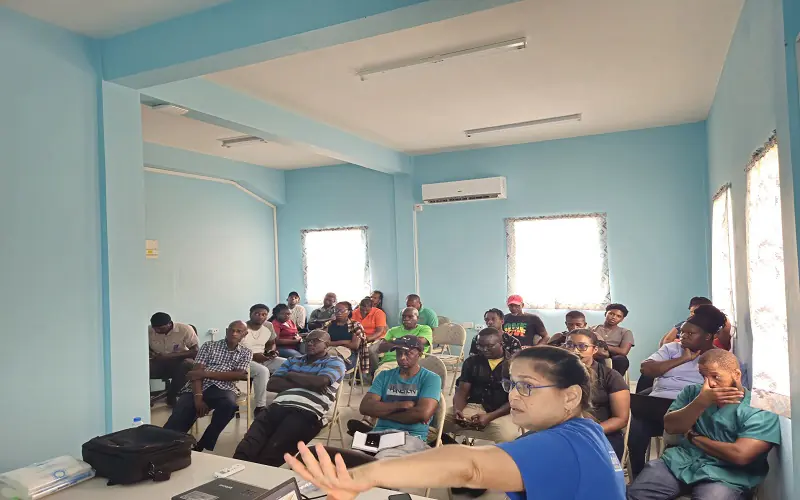Saint Lucia bolsters pig production to help strengthen its food security
As natural disasters like Hurricane Beryl threaten our food security, pig stakeholders in St Lucia are determined to acquire the knowledge and skills necessary to improve their production.
Amidst the impacts of Hurricane Beryl on the island, some 25 pig farmers and technicians participated in the first series of a training programme on pig reproduction and breeding provided by the Food and Agriculture Organization of the United Nations (FAO) and the Ministry of Agriculture, Fisheries, Food Security and Rural Development.
Delivered under a project of FAO’s Technical Cooperation Programme on promoting competitive import substitution and export agricultural value chains in St. Lucia, the training programme is one of the activities from the country’s 2023-2028 Pork Value Chain Upgrading Strategy that was developed by the pig industry’s public and private stakeholders, the National Pork Value Chain Team along with FAO’s Value Chain Development team. The training sought to respond to the first strategic area from the plan on enhancing productivity and efficiency through commercial pig farming, utilizing modern management practices and technologies.
The reproduction and breeding trainings were delivered in the field and as classroom sessions and followed a training-of-trainers approach. The trainings were designed to build the knowledge and capacity of the pig farmers and technicians to increase farm-level productivity whilst minimizing production costs.
Whereas three days of training were cancelled due to Hurricane Beryl, farmers and technicians spent the last two days engaging with FAO Livestock Consultant, Dr Gabrielle Young, as she imparted knowledge on the pig reproductive cycle and shared techniques to encourage effective piggery management, that could lead to higher birth rates and healthier piglets.
Ms Elisha Leon, Agricultural Officer in the Veterinary and Livestock Services Division of the Ministry emphasized that “this workshop broadened my knowledge on feeding management of pigs at the various growth stages. In turn I could equip my farmers with this information as feeding and nutrition of pigs in St Lucia is one of the major factors limiting production”.
In addition to the in-person training, the FAO team delivered recordings of training sessions for distribution to farmers, especially those who were unable to attend the training due to the impacts of Hurricane Beryl. These recordings will also be used by the trainers in follow-up activities.
Dr Auria King-Cenac, Director of Agricultural Services in the Ministry, remarked that “although the mission was severely affected by the passage of Tropical Cyclone Beryl, the Ministry is extremely grateful that all was not loss. Though moderated, this training being a critical factor in the growth of our sector and our quest to encourage food sovereignty and by extension create a food and nutrition secure Saint Lucia was still able to be undertaken. This capacity building endeavour served not only to educate our farmers and technicians but also to strengthen and reinforce what they have already been exposed to. We express our gratitude, and we look forward to implementing the knowledge acquired to bolster our industry.”
Mr Juan Cheaz Pelaez, FAO Trade and Markets Officer for the Caribbean and Lead Technical Officer for the project, spoke on the resilience and determination of the farmers and on the importance of this training programme. He noted that “the farmers and technicians who were able to attend this training, in the aftermath of a hurricane, is a testament to the dedication and determination of our farmers and the value they place on improving and increasing production. Looking at the damage caused by Hurricane Beryl in several Caribbean countries, it is now more than ever that we must think about ensuring our food security. Honing the skills and acquiring the knowledge necessary to produce better will help in this effort and enable farmers to supply a higher quality product in greater volumes for development of the sector”.
Dr King-Cenac commented that, “despite the fact that pork production generates substantial income for rural people, the local subsector is still growing, and it continues to show tremendous potential”. She noted that “the domestic demand for pork is fuelled by both the booming tourism industry and the local population. Presently there are approximately 263 active swine farms and 2023 saw the production of about 362.3 tons of pork locally, contributing 5.1 million Eastern Caribbean Dollars to the economy”.
Mr Jefferson Jaikissoon, FAO Agriculture Value Chain Development Specialist led the mission in St Lucia and along with Dr Young, also interviewed several pig farmers to understand some of their production constraints. The duad also conducted a site visit to a local feed mill to learn more about their operations in the production of feed for pigs and spent time to develop a good understanding of the costs of producing pork in the country. These findings will be included in a report on the assessment of the pork value chain to be completed by FAO in the coming months.
In the coming months, FAO, the National Pork Value Chain team and other stakeholders will continue to carry out activities from the upgrading strategy including more training for farmers. Additionally, FAO’s Livestock Development Officer will meet with technicians, from the Ministry of Agriculture, to examine guidelines for a pig breeding programme as well as develop a strategy for the promotion of artificial insemination in pigs.






